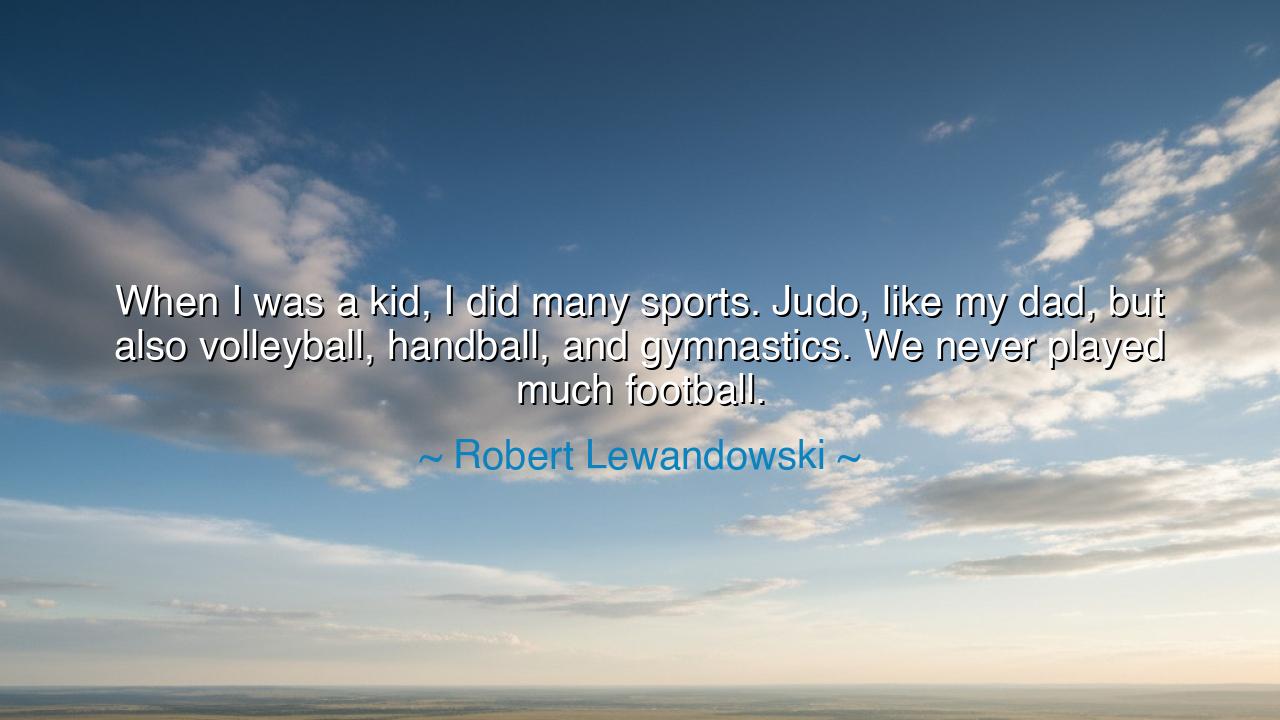
When I was a kid, I did many sports. Judo, like my dad, but also
When I was a kid, I did many sports. Judo, like my dad, but also volleyball, handball, and gymnastics. We never played much football.






Hear the words of Robert Lewandowski, who reflects upon the beginnings of his journey: “When I was a kid, I did many sports. Judo, like my dad, but also volleyball, handball, and gymnastics. We never played much football.” At first, the statement seems ordinary, the memory of a child’s play. Yet within it lies a deeper truth about growth, discipline, and the unexpected paths of destiny.
When he speaks of many sports, he speaks of variety, of the shaping of body and spirit through different forms of training. Each discipline taught him something unique: from judo, respect and balance; from volleyball and handball, teamwork and coordination; from gymnastics, strength and agility. Though the world would later know him as a master of football, it was these early foundations that sharpened his body and mind, preparing him for greatness in ways he could not yet see.
The mention of his dad is not to be overlooked. By beginning with judo, the sport of his father, Lewandowski shows the ancient rhythm of inheritance. The child often follows the footsteps of the parent, receiving not only skill but also values, discipline, and a sense of continuity. This is how traditions are passed, not as shackles but as seeds planted in young soil, which may grow into unexpected fruits. For though Robert did not remain in judo, the lessons of his father’s world gave him roots strong enough to grow elsewhere.
And yet, the most striking part of his words is this: “We never played much football.” How ironic, that the man who would rise to become one of the greatest strikers in the world, whose goals would thunder across stadiums, began in a place where football was not central. This is the paradox of destiny: it often begins quietly, outside the obvious path, preparing the soul through detours until the true calling reveals itself. The ancients would have called this fate’s hidden design.
Consider the story of Miyamoto Musashi, the legendary Japanese swordsman. In his youth, he fought not for glory but for survival, practicing with wooden sticks before he ever mastered the blade. The skills he gained in hardship, outside the formal path of training, became the foundation of his unmatched genius. So too with Lewandowski: the sports of his childhood, though not football, forged the balance, power, and discipline that would later make him a legend on the pitch.
The deeper meaning here is that the road to mastery is rarely straight. One may begin in places that seem unrelated to their destiny, but in truth, each step prepares the way. Every skill learned, every discipline embraced, every lesson endured is gathered into the soul, ready to be transformed when the calling comes. To despise the small beginnings, or to doubt the relevance of early struggles, is to misunderstand the weaving of fate.
The lesson for us is clear: embrace the variety of your experiences. Do not fear if your path seems uncertain, or if your beginnings appear disconnected from your dreams. Like Lewandowski’s childhood sports, they may be the very soil from which your greatness will spring. The practical action is to give yourself fully to whatever is before you—whether study, work, or play—knowing that no discipline is wasted, and that the future may gather all these scattered pieces into a masterpiece you cannot yet imagine.
Thus, Lewandowski’s memory becomes more than nostalgia; it is a teaching for all who seek purpose. Life’s destiny often hides in unexpected beginnings, and the greatness of tomorrow is prepared in the humble disciplines of today.






AAdministratorAdministrator
Welcome, honored guests. Please leave a comment, we will respond soon